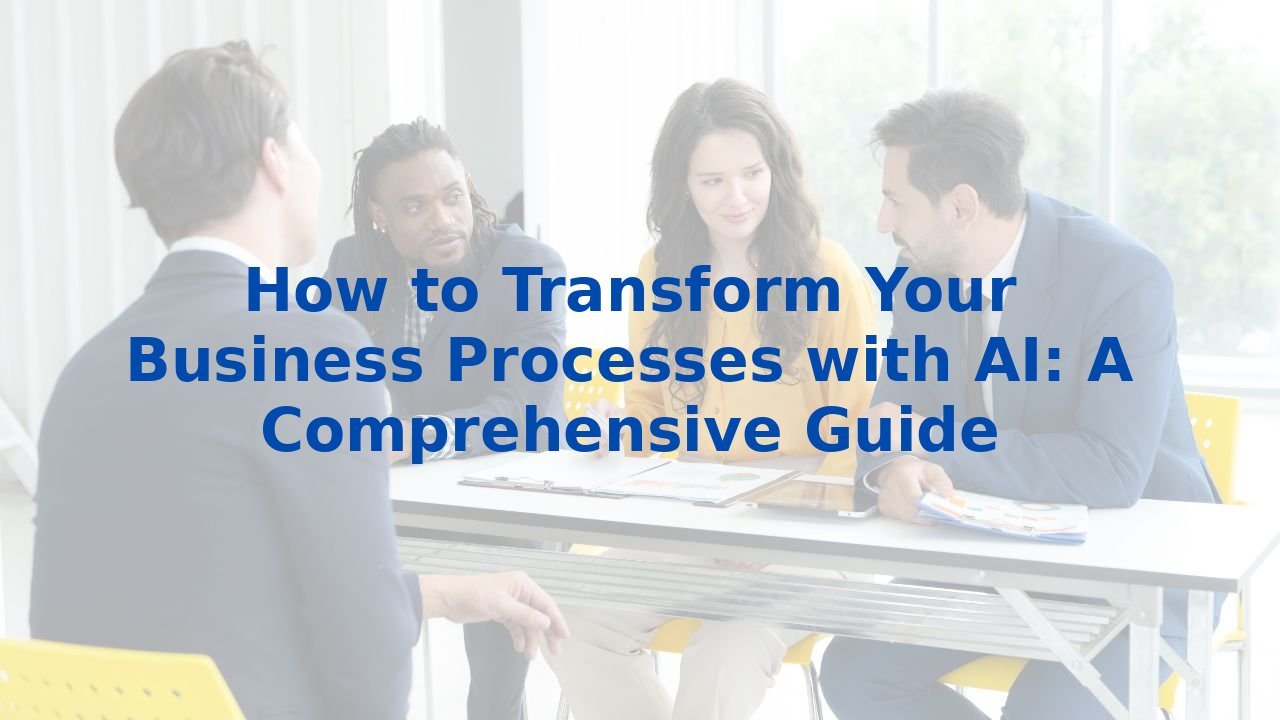How To Transform Your Business Processes with AI: A Comprehensive Guide
How To Transform Your Business Processes with AI: A Comprehensive Guide
In an age where agility and efficiency are paramount, organizations are continuously on the lookout for innovative ways to enhance their operations. At the forefront of these innovations is Artificial Intelligence (AI), a game-changing tool that maximizes efficiency and refines business processes. Let's explore how AI can transform your organizational processes and lead to substantial improvements.
1. Process Discovery and Mapping
Understanding your current processes is the first step toward enhancing them. Traditional methods of map-making often involve tedious manual data analysis and employee interviews, which can introduce biases and overlook critical inefficiencies. AI-driven process mining revolutionizes this stage by harnessing advanced technologies like pattern recognition and natural language processing.
With AI, businesses can gain a comprehensive overview of their operational workflows. It uncovers hidden inefficiencies and bottlenecks that manual processes might overlook. By pinpointing areas ripe for optimization, AI provides clarity and direction for improvement strategies. By investing time and resources into AI learning for your team, you can equip them to leverage these insights effectively.
2. Process Automation
Automation stands out as a significant advantage of AI in enhancing business process management. Leveraging AI bots allows organizations to automate mundane tasks—think of data entry, document processing, and various routine administrative activities. This transition alleviates the burden on employees, enabling them to direct their energies toward more engaging and strategic tasks.
As tasks that once consumed significant time are automated, not only does this save precious hours, but it also drastically reduces human error. The result? A workforce focused on creativity and innovation rather than being mired in repetitive tasks, all spelling a boost in overall productivity.
3. Data Analysis and Visualization
The data deluge businesses face today can be overwhelming. However, AI turns this tide in favor of companies by significantly accelerating the data analysis process. Its ability to sift through vast datasets at lightning speed reveals invaluable trends and outcomes, underscoring the effectiveness of a data-driven approach.
AI enables businesses to make informed decisions, helping to identify root causes of issues while optimizing their processes. Integrating analytics into your operations does not just enhance decision-making but fosters a culture of informed strategy, creating a cohesive bridge between departments.
4. Decision Support and Optimization
In complex decision-making landscapes, AI emerges as a beacon of clarity. By processing both structured and unstructured data from a multitude of sources, AI can provide extensive information to guide decision-makers. The extraction of relevant patterns further bolsters this decision-making engine, allowing leaders to visualize potential risks and impacts clearly.
This empowered approach enhances strategic foresight, equipping leaders with the insights required to navigate intricate business landscapes. With AI as a partner, organizations can shift from reactive to proactive decision-making, positioning themselves advantageously in competitive markets.
5. Real-Time Monitoring and Predictive Analytics
Imagine having visibility into your business processes in real-time—a game changer, isn’t it? AI enables organizations to monitor process status instantaneously. This continuous oversight allows businesses to act promptly, addressing issues as they arise and capitalizing on emerging opportunities.
Moreover, predictive analytics powered by AI offers a glimpse into potential future outcomes based on historical data. This capability arms organizations against potential bottlenecks, ensuring fluid process flows and maintaining operational excellence.
Benefits of AI Integration
Embracing AI can prove transformative for organizations striving for improvement. The integration of AI brings forth a multitude of benefits, including:
- Improved Efficiency: Automation reduces the manpower required for routine tasks.
- Enhanced Decision-Making: AI-driven insights guide action and inform strategy.
- Reduced Costs: Efficiency leads to significant cost savings across the board.
- Increased Productivity: Employees are liberated to focus on high-value activities.
- Better Customer Service: Automated responses and personalized interactions enhance customer experiences.
Training Employees for AI
A common misconception is that AI will run itself, but the human element remains critical. Training employees for AI integration amplifies its effectiveness across the organization. Knowledge gaps can impede AI performance, making internal training essential to ensure full utilization.
Investing in AI training enhances understanding of AI capabilities, fosters data interpretation skills, and helps employees identify optimization opportunities within their processes. An adaptable workforce is better equipped to harness AI’s full potential, facilitating seamless integration into existing workflows.
Conclusion
The journey of transforming business processes through AI is one woven with opportunities for learning, growth, and innovation. By enhancing process discovery, automation, real-time monitoring, and decision support, organizations can experience unprecedented operational efficiencies. Moreover, prioritizing employee training ensures that the human element fully leverages AI’s capabilities. In an ever-evolving marketplace, integrating AI into your business strategy is not merely advantageous; it is essential for sustained competitive success.



